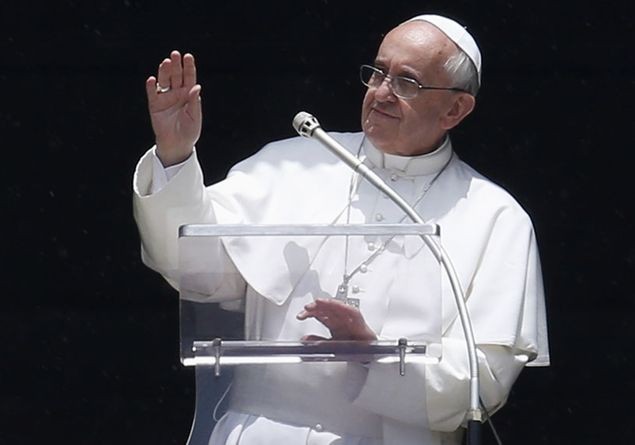Pope Francis Angelus in Saint Peter's Square

POPE FRANCIS
ANGELUS
St Peter's Square
Sunday, 30 October 2016
Dear Brothers and Sisters, Good morning!
Today’s Gospel presents us with an event that happened in Jericho, when Jesus entered the city and was welcomed by the crowd (cf. Lk 19:1-10). In Jericho lived Zacchaeus, the chief of the “publicans”, that is, of the tax collectors. Zacchaeus was a wealthy agent of the hated Roman occupation, an exploiter of his people. Out of curiosity, he too wanted to see Jesus, but his status as a public sinner did not allow him to approach the Master; moreover, he was small of stature, and for this reason he climbed a sycamore tree, along the road where Jesus was to pass.
When he neared that tree, Jesus looked up and said to him: “Zacchaeus, make haste and come down; for I must stay at your house today” (v. 5). We can imagine Zacchaeus’ astonishment! Why does Jesus say “I must stay at your house”? What duty does this refer to? We know that his highest duty is to implement the Father’s plan for all of mankind, which is fulfilled in Jerusalem with his death sentence, the crucifixion and, on the third day, the Resurrection. It is the Father’s merciful plan of salvation. And in this plan there is also the salvation of Zacchaeus, a dishonest man who is despised by all, and therefore in need of conversion. In fact, the Gospel says that when Jesus called him, “they all murmured, ‘He has gone into the house of a sinner!’” (cf. v. 7). The people saw Zacchaeus as a scoundrel who became rich at his neighbours’ expense. Had Jesus said: “Come down, you, exploiter, you traitor of the people! Come to speak with me and settle the score!”, surely the people would have applauded. Instead, they began to whisper: “Jesus is going to his house, the house of the sinner, the exploiter”.
Guided by mercy, Jesus looks for him precisely. And when he enters Zacchaeus’ house he says: “Today, salvation has come to this house, since he also is a son of Abraham. For the Son of Man came to seek and to save the lost” (vv. 9-10). Jesus’ gaze goes beyond sins and prejudices. And this is important! We must learn this. Jesus’ gaze goes beyond sins and prejudices; he sees the person through the eyes of God, who does not stop at past faults, but sees the future good; Jesus is not resigned to closing, but always opens, always opens new spaces of life; he does not stop at appearances, but looks at the heart. And here he sees this man’s wounded heart: wounded by the sin of greed, by the many terrible things that Zacchaeus had done. He sees that wounded heart and goes there.
Sometimes we try to correct or convert a sinner by scolding him, by pointing out his mistakes and wrongful behaviour. Jesus’ attitude toward Zacchaeus shows us another way: that of showing those who err their value, the value that God continues to see in spite of everything, despite all their mistakes. This may bring about a positive surprise, which softens the heart and spurs the person to bring out the good that he has within himself. It gives people the confidence which makes them grow and change. This is how God acts with all of us: he is not blocked by our sin, but overcomes it with love and makes us feel nostalgia for the good. We have all felt this nostalgia for the good after a mistake. And this is what God Our Father does, this is what Jesus does. There is not one person who does not have some good quality. And God looks at this in order to draw that person away from evil.
May the Virgin Mary help us to see the good that there is in the people we encounter each day, so that everyone may be encouraged to bring out the image of God imprinted in their hearts. In this way we can rejoice in the surprises of the mercy of God! Our God, who is the God of surprises!
After the Angelus:
Dear brothers and sisters, yesterday in Madrid, José Antón Gómez, Antolín Pablos Villanueva, Juan Rafael Mariano Alcocer Martinez and Luis Vidaurrázaga Gonzáles were beatified. They were martyrs, killed in Spain in the last century during the persecution against the Church. They were Benedictine priests. Let us praise the Lord and entrust to their intercession our brothers and sisters who, sadly, still today, in various parts of the world, are persecuted for their faith in Christ.
I express my closeness to the people of central Italy who were struck by the earthquake. Even this morning there was a powerful tremor. I pray for the injured and for the families who have suffered major damage, as well as for the personnel involved in the rescue operations. May the Risen Lord give them strength and may Our Lady watch over them.
Over the next two days I shall make an Apostolic Journey to Sweden, on the occasion of the commemoration of the Reformation, which will see Catholics and Lutherans gathered together in remembrance and prayer. I ask all of you to pray that this trip may be a new step on the path of fraternity towards full communion.
I wish you all a happy Sunday — the sun is shining — and a happy All Saints’ Day. And, please, do not forget to pray for me. Have a good lunch. Arrivederci!
